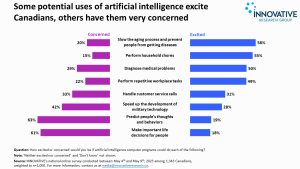

In an ever-evolving digital landscape and a world grappling with complex social issues, INNOVATIVE continues to support the Provocation Ideas Festival on its mission to foster a new public square of spirited discussion.
Through vibrant public discussions, art, theatre, film, music, and storytelling, the Provocation Ideas Festival brings together scholars, activists, community members, artists, and performers to explore and understand the critical issues that directly impact us and our communities.
This year, the festival aims to facilitate thoughtful conversations centered around the rise of artificial intelligence (AI), digital media, mental health, crime and justice, as well as generational differences in Canadians’ attitudes towards these subjects.
These subjects hold tremendous significance as they shape the future of technology’s impact on our daily lives and influence the way we approach mental health support within the criminal justice system. By exploring these areas, we can better understand the concerns, aspirations, and potential risks associated with the rise of artificial intelligence and seek meaningful solutions to ensure a more just society.
A poll of 1,343 Canadians was conducted from May 4th to 9th for the Provocation Ideas Festival by Innovative Research Group. The results are weighted to 1,000 by age, gender, region, and party identification to reflect the actual population according to Census data. A detailed methodology is provided in the report.
Many Canadians are concerned about artificial intelligence
Canadian sentiments on AI are complex, with many reporting feeling both concerned and excited about the novel technology’s various applications.
Many Canadians are concerned about how AI will impact their daily lives and believe it should be regulated. 47% of Canadians are more concerned than excited about the increased use of artificial intelligence, with only 9% saying they are more excited than concerned. Further, a majority of Canadians (78%) think that AI should be regulated even if it is difficult — which 73% of respondents believe it will be.
Canadians are fearful of AI but also cautiously excited. Survey respondents said they would be excited if AI could one day do household chores (55%), perform repetitive tasks (50%), diagnose medical problems (49%), or slow the aging process and prevent disease (58%). However, many are concerned with the possibility that AI might be used to speed up the development of military technology (42%), make important life decisions for people (61%), and predict people’s thoughts and behaviours (64%).
Of those polled, only 8% believe AI should be unregulated, but the road to regulation is likely to be a challenging one. There seems to be awareness of this amongst those polled, with 73% believing such regulation will be somewhat or very difficult and a majority (54%) suggesting that such regulation would be more effective if negotiated and enforced internationally.
Overall, this combination of attitudes reflects a public uncertain but curious about new technology. They recognize the potential advantages of AI, yet express concerns about its potential misuse that could compromise safety and undermine personal autonomy. Considering the novelty of AI, this is not surprising, but the findings shed light on the current open space for AI research and policy.
Justice system failing those with mental health issues, according to Canadians
Only 16% say the country’s criminal justice system is doing a good job supporting those with mental health issues. The opinion that the system is failing this vulnerable group is consistent across demographic groups, including amongst supporters of all political parties.
Of those surveyed, almost half (45%) believe that alternative approaches to criminal justice are a good idea, with only 12% expressing opposition to the proposal. A plurality of Canadians also believe that the justice system should prioritize rehabilitation over punishment (48% vs 41%), with those who have accessed mental health or substance misuse support significantly more likely to believe in rehabilitation (65%). The poll results show that three out of five Canadians (61%) want the use of illegal drugs to be considered an illness rather than a crime, with prevention and treatment prioritized.
When it came to their own experiences with mental health or substance misuse supports, 26% of Canadians said they had accessed or tried to access help for themselves or someone they know within the past year. Of those, 40% were unable to access mental health or substance misuse support — that is one in every ten Canadians. Women aged 18–34 were far more like to have accessed support than those in other demographic groups.
These findings highlight a widespread belief that the criminal justice system fails to adequately support individuals with mental health issues and substance misuse, suggesting that it is time to change how we treat and support those in need.
The 2023 Provocation Ideas Festival is happening in May/June 2023 in and around Toronto, Ontario, and features panel discussions, art exhibits, and immersive activities. INNOVATIVE is a sponsor of the festival.
Check out the full list of events that are part of the Provocation Ideas Festival.


































